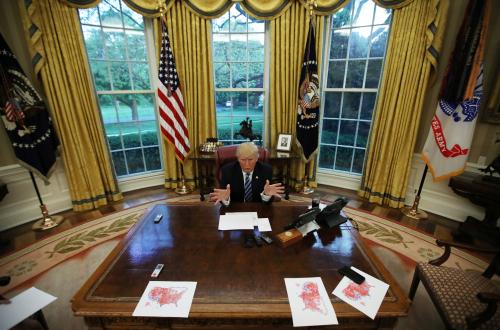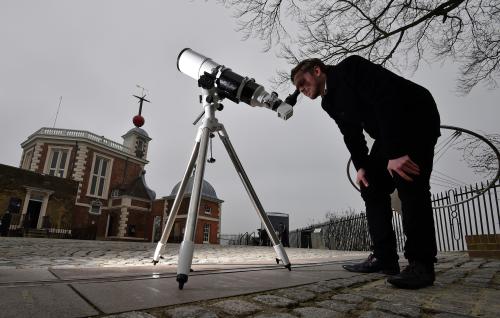Why does America have such great science but terrible politics? Only a couple of weeks ago, a United States spacecraft flew 293 million miles to Mars and safely landed an SUV-sized rover, all without damaging any of its onboard equipment, operating with an 11-minute communications lag, and navigating an atmosphere much thinner than Earth’s.
Yet despite our nation’s scientific prowess, our politics are terrible. Right now, America is plagued by political extremism, polarization, and hyper-partisanship. There is massive public cynicism and a lack of confidence in leading institutions. We have difficulty addressing basic problems, especially those involving the nation’s long-term needs. It is not clear that a closely divided House and 50-50 Senate is going to alter that reality.
How can we explain this seeming disparity between our scientific successes and political failures, and can we continue to be successful in the scientific realm if we leave our political problems unaddressed? As I outline below, there are fundamental differences between the sectors in terms of capacity for change, national investment, respect for expertise, and organizational culture. Fixing our clear dysfunctions must be a national priority. Otherwise we will end up with bad politics and science.
The case for our scientific successes
Even with the regular successes of NASA over the past several decades, it boggles the mind that we can land on another planet and have high quality images of the landscape almost instantaneously. Although NASA and university scientists make this look easy, we know that is not the case. Several countries, such as India, Great Britain, Japan, and Russia, have failed in their efforts to land on Mars.
The current landing is the fifth rover America has placed on Mars, and Perseverence is poised to make major scientific breakthroughs. It has equipment onboard that can test for the remnants of microbial life in the ancient lake bed where it landed. It is equipped with a helicopter that can provide an overview of the area to be explored. It can scoop up and store rocks that eventually will be brought back to Earth for more intensive analysis.
Our nation is also a leader in artificial intelligence, cloud computing, neuroscience, genetics, semiconductor development, and many other areas. In the midst of the COVID pandemic, our scientists worked with those from other countries to design new vaccines that reduce the disease and its associated fatalities. Indeed, our institutions of higher learning attract talented students from around the globe and are considered among the best in the world.
The contrast with our politics
In contrast, our political operations are crumbling. Our government was organized 230 years ago in a highly agrarian society, and the founders required two-thirds of Congress and three-fourths of state legislatures to approve any major institutional changes. Though there have been 27 successful amendments to the Constitution, it is very difficult to update our institutional arrangements for an economy and society that have been transformed since 1789.
The challenge of making structural improvements means that as our country has urbanized, become more diverse, seen much of its economic activity migrate to the coasts, and been globalized, it is hard to update our institutions to reflect those changing realities.
In the post-World War II era, Congress and the president have scaffolded our scientific endeavors for success. They fund scientists, support higher education, train the next generation of experts, and insulate scientific enterprises as much as possible from political maneuvering. The scientific enterprise also features highly trained individuals who operate based on facts, cooperate internationally, and work together in a collegial manner. None of that is true for our politics.
The high level of political misinformation would never be tolerated in science. If Mars scientists launched Perseverance based on false theories or fake information, it would not have landed safely on Mars. Scientific principles would have laid bare the falsehoods for all to see. Yet there is no parallel corrective mechanism for truth or facts in the political world as leaders can spout lies without being held accountable for their inaccuracies. What’s more, political scientists have shown that correcting misinformation often sparks a “backfire effect” in which misperceptions become even more tightly held.
Our scientific culture explicitly encourages new thinking and innovative practices, and rewards successful innovators. Experts who develop new approaches receive Nobel prizes that glorify their creativity. The opposite is true in public affairs. Innovation is not rewarded and efforts to improve political performance are derided as misguided leadership.
Reforming political governance
The central challenge facing the United States is the rise of anti-majoritarian elements within many of our leading political institutions. For example, the Electoral College violates “one person, one vote” principles by overrepresenting small and medium-sized states and underrepresenting large states. A person’s vote in Wyoming and Idaho counts for more than someone’s in California, New York, or Texas. If one looks at presidential elections starting in 1992, Republicans have won the popular vote only once (in 2004) in eight elections, yet held the presidency for 12 of the 28 years from 1992 to 2020.
The Senate contains a related kind of inequitable representation. Courtesy of the 60-vote requirement to end filibusters in order to vote on non-budgetary matters, that chamber allows 41 percent of its members to block policy actions often desired by large majorities. There is a related problem in the House, although through a different mechanism. In that body, gerrymandered districts overrepresent Republican-dominated rural areas and underrepresent Democratic voters in urban ones. That can lead to issues favored by large numbers of voters being blocked by representatives sitting in safe albeit unrepresentative seats.
If you throw in a Supreme Court dominated by conservatives and voter suppression being practiced by Republicans at the state level, it becomes clear why our political institutions function poorly. Our political structures overweight the interests of a minority of the nation’s population. American politics is not representative of the entire country, and institutions have not been sufficiently updated to reflect how the country has changed since 1789. The contemporary system engenders extremism and hyper-partisanship that prevents us from addressing the roots causes such as income inequality and geographic disparities that disturb many voters.
If we are not careful, our political dysfunction could endanger our scientific and technological expertise. Unless we make meaningful changes that improve political representation and institutional performance, we risk a future where both our politics and science are terrible. That would be a catastrophic outcome for the United States and endanger our economy, society, and global leadership.
The Brookings Institution is committed to quality, independence, and impact.
We are supported by a diverse array of funders. In line with our values and policies, each Brookings publication represents the sole views of its author(s).








Commentary
Why America has great science but terrible politics
March 9, 2021